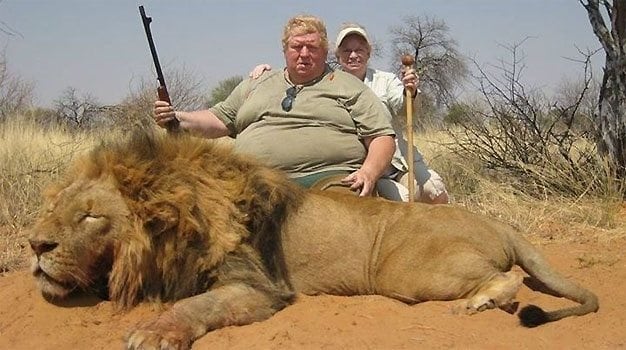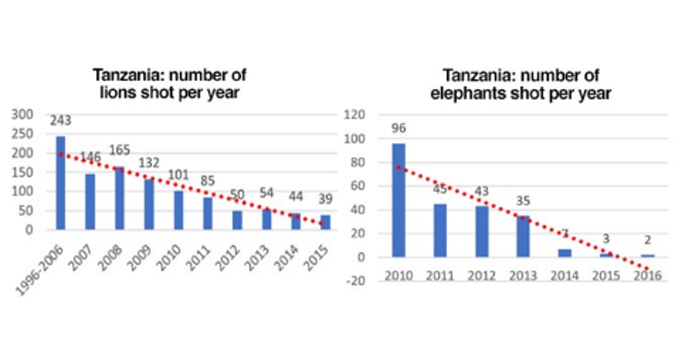
This is the economically correct approach to assessing the value of an industry. Big game hunting in West Africa: What is its contribution to conservation? Strapping, ruddy, and blond, in his 40s, he seemed straight from central casting, wearing a cloth hat and shorts. In Michigan alone, nearly , people hunt deer.
From Wikipedia, the free encyclopedia
Trophy hunting or sport hunting is hunting of wild game for human recreation. The trophy is the animal or part of the animal kept, and usually displayed, to represent the success of the hunt. The game sought is typically a large or impressively ornamented male, such as one having large horns or antlers. Generally, only parts of the animal are kept as a trophies usually the head, skin, horns or antlers and the carcass itself is used for food. Trophies are often displayed in the hunter’s home or office, and often in specially designed makf rooms,» sometimes called «game rooms» or «gun rooms,» in which the hunter’s weaponry is displayed doess. Trophy hunting has both firm supporters and strong opponents. Debates surrounding trophy hunting centrally concern not only the question of the morality of recreational hunting and supposed conservation efforts of big-game and ranch hunting, but also the observed decline in animal species that are targets for trophy hunting.
Top Contributors

All rights reserved. Barrett, who is British, and others argue that Western hunters provide vital revenue to local communities. African elephants are in trouble. Their numbers have fallen from as many as ten million a hundred years ago to as few as , today. Recent losses are largely from poaching for the illegal ivory trade some 30, elephants a year , but also because of the shrinking habitat for elephants, as people open up land for farming and development. Killing more elephants to help save the species is one counterintuitive strategy for preserving them.
How much does SA earn from trophy hunting?
All rights reserved. Barrett, who is British, and others argue that Western hunters provide vital revenue to local communities. African elephants are in trouble. Their numbers have fallen from as many as ten million a hundred years ago to as few astoday. Recent losses are largely from poaching for the illegal ivory trade some 30, elephants a yearbut also because of the shrinking habitat for elephants, as people open up land for farming and development.
Killing more elephants to help save the species is one counterintuitive strategy for preserving. The International Union for Conservation of Nature, an internationally recognized organization that sets the conservation statuses for species, supports this idea. But a closer look at trophy hunting in Africa shows that the industry employs few people and that the money from hunt fees that trickles down to needy villagers is minimal. Government corruption can be a factor. In Zimbabwe, for instance, individuals associated with President Robert Mugabe have seized lands in lucrative hunting areas.
Along with Cameroon and Gabon, these nations allow sport hunting regardless of the level of decline in their elephant populations.
Botswana, which has more thanelephants by one recent estimate, has banned trophy hunting. In Zimbabwe, a recent survey shows massive losses in some parks. In Tanzania and Mozambique, elephants are now considered at risk of extinction, which means that none of their products can be traded commercially. Namibia, a destination for sport hunters, is one of six African countries with significant populations of savanna elephants. In Etosha National Park, tourists come from around the world to see the elephants.
From totrophy hunters exported more than 28 tons of tusks from Zimbabwe. In turn, safari operators sell sport hunting opportunities, mostly to foreigners. But the benefits from the program are not equally shared within the communities, according to a study analyzing CAMPFIRE, and corruption has eaten away at revenue. Rural councils in Zimbabwe are notoriously underfunded and almost always have nothing in their coffers to support the communities in their districts.
For example, revenue from sport hunting in the Chiredzi Rural District where the hunter shot that big bull elephant was negligible, according to a end-of-year report. He claimed that the money is goes to infrastructure and food programs for local communities.
Safari and game reserves are one of the few remaining lucrative industries in Zimbabwe, both for legal and illegal hunting.
The country has lost 60 percent of its elephants to poaching in just five years. The takeover of these lands has coincided with overhunting and poaching, according to the report, as how much money does africa make annually from trophy hunting political elites who have come to manage them are driven more by profit than conservation.
Revenue is more likely to go into personal and foreign bank accounts than into conservation and community programs. Poaching in the area has already begun, the report says. Rugeje also alleged to have been involved in the eviction of villagers at Matutu conservancy in Chiredzi. Established by the Namibian government inthe program grants communities the power to manage wildlife on communal land and to work with private companies to develop their own tourism markets.
The vast majority of this income is returned to operators and spin-off beneficiaries such as airlines, hotels, tourism facilities, but there is a trickle-down effect. Conservancy lands given over to trophy hunting have the added benefit of keeping the wild, wild. If these areas were farmed, for instance, the incentives for conservation would undoubtedly wane, and habitat loss would reduce wildlife numbers.
The ecological footprint of trophy hunting—even of a safari how much money does africa make annually from trophy hunting catering for groups of wildlife watching tourists—is far lighter than that of commercial farming. Conservancies offer hunt operators land largely devoid of people—a draw for hunters who want an African wilderness experience. Camps are small, with few overheads other than equipment and licenses.
As reported in Africa Geographic, some government officials have handed out elephant hunting permits in an effort to get political support from the communities, especially in the Kunene region, which is renowned for its rare desert elephants. CNN reported that several desert elephants have been shot either for their meat or for the cash from hunt fees. According to an IUCN reportthe sport hunting industry does not provide significant benefits to the communities where it occurs.
Across Africa, there are only about 15, hunting-related jobs—a tiny number, especially considering that the six main game-hunting countries alone have a population of nearly million. Besides that, local communities make an average of only ten cents a hectare 25 cents an acre from trophy hunting. With more than one-sixth of the land in those six countries set aside for trophy hunting, and the fact that land-hungry politicians are seizing more and more land for themselves, impoverished rural communities often resort to poaching and the illegal wildlife trade to sustain themselves.
Citing the failure of trophy hunting interests to provide much needed revenue for both conservation and communities, and the failure of governments to control rampant elephant poaching, the U. Fish and Wildlife Service imposed a ban on imported elephant trophies from Zimbabwe and Tanzania for and The ban is likely to be extended indefinitely. The view that sport hunting of elephants in Zimbabwe and Tanzania is causing more harm than good is gaining momentum. Still, the U.
Read more stories about wildlife crime and exploitation on Wildlife Watch. Send tips, feedback, and story ideas to ngwildlife natgeo. Read Caption. By Adam Cruisefor National Geographic. Photograph by Manuel Romaris, Getty. Zimbabwe: 1, tusks Namibia: tusks Zambia: tusks Tanzania: tusks Mozambique: tusks South Africa: tusks. Continue Reading.
Special Interest: The Truth About Trophy Hunting in Africa
How much does SA earn from trophy hunting?
Recent Posts. Researchers took into account average spending on licenses, permits, hunting gear and ammunition, as well as air fares, food, clothing, trophy handling and shipping costs, plus additional tours and travel costs. Alternatives and the way forward The proponents of trophy hunting claim that there are no viable alternatives for Africa. Kenya has banned trophy hunting outright sinceand in Botswana, a comparatively wildlife-rich country, a temporary ban in government-controlled hunting areas went into effect in The earliest evidence of an elephant having been killed by human hands dates back to a blue-mud swamp in Siberia nearly 14, years ago. In terms of the wider tourism economy, which relies heavily on wildlife resources, trophy hunting is relatively insignificant. Biologists estimated total losses of large mammals in protected areas on the continent at up to 60 percent between and While this and other pro-trophy hunting economic studies proclaim that trophy hunters are motivated by more than just the hunt, and that trophy hunters value outdoor wildlife experiences in exotic locations, these same studies assume that no trophy hunters would visit these countries if not for trophy hunting, and that no non-trophy hunting activities would occur if hunting ceased.

Comments
Post a Comment